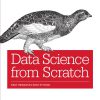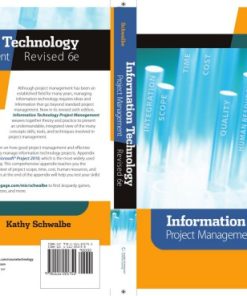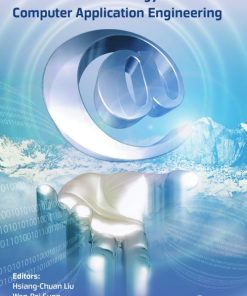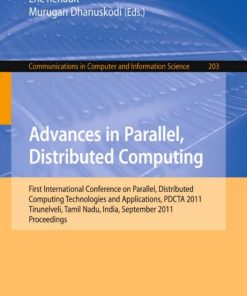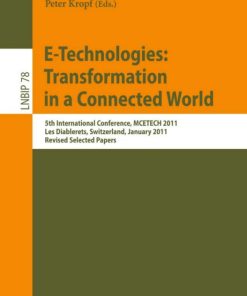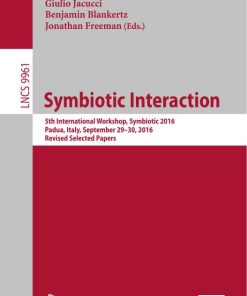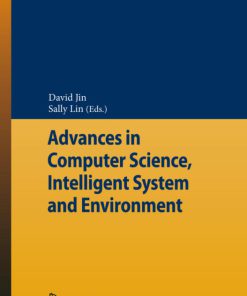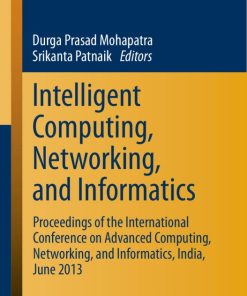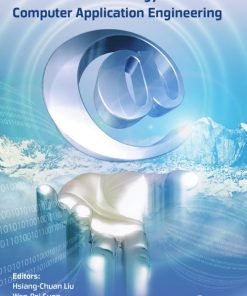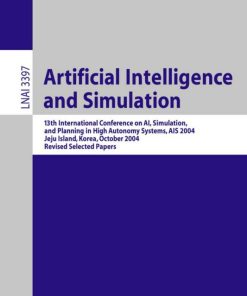Advances in Intelligent Systems and Computing Selected Papers From the International Conference on Computer Science and Information Technologies CSIT 2016 September 6 10 Lviv Ukraine 1st edition by Natalya Shakhovska 9783319459912 3319459910
$50.00 Original price was: $50.00.$25.00Current price is: $25.00.
Authors:Natalya Shakhovska , Series:IT & Computer [183] , Tags:Technology & Engineering; Engineering (General); Computers; Data Science; Data Analytics; Telecommunications; Business & Economics; Information Management; Artificial Intelligence; General; Business Mathematics; Advances in Intelligent Control Systems and Computer Science , Author sort:Shakhovska, Natalya , Ids:Google; 9783319459912 , Languages:Languages:eng , Published:Published:Sep 2016 , Publisher:Springer , Comments:Comments:The book reports on new theories and applications in the field of intelligent systems and computing. It covers computational and artificial intelligence methods, as well as advances in computer vision, current issue in big data and cloud computing, computation linguistics, cyber-physical systems as well as topics in intelligent information management. Written by active researchers, the different chapters are based on contributions presented at the workshop in intelligent systems and computing (ISC), held during CSIT 2016, September 6-9, and jointly organized by the Lviv Polytechnic National University, Ukraine, the Kharkiv National University of Radio Electronics, Ukraine, and the Technical University of Lodz, Poland, under patronage of Ministry of Education and Science of Ukraine. All in all, the book provides academics and professionals with extensive information and a timely snapshot of the field of intelligent systems, and it is expected to foster new discussions and collaborations among different groups.
Advances in Intelligent Systems and Computing Selected Papers From the International Conference on Computer Science and Information Technologies CSIT 2016 September 6 10 Lviv Ukraine 1st edition by Natalya Shakhovska- Ebook PDF Instant Download/Delivery. 9783319459912, 3319459910
Full download Advances in Intelligent Systems and Computing Selected Papers From the International Conference on Computer Science and Information Technologies CSIT 2016 September 6 10 Lviv Ukraine 1st edition after payment

Product details:
ISBN 10: 3319459910
ISBN 13: 9783319459912
Author: Natalya Shakhovska
The book reports on new theories and applications in the field of intelligent systems and computing. It covers computational and artificial intelligence methods, as well as advances in computer vision, current issue in big data and cloud computing, computation linguistics, cyber-physical systems as well as topics in intelligent information management. Written by active researchers, the different chapters are based on contributions presented at the workshop in intelligent systems and computing (ISC), held during CSIT 2016, September 6-9, and jointly organized by the Lviv Polytechnic National University, Ukraine, the Kharkiv National University of Radio Electronics, Ukraine, and the Technical University of Lodz, Poland, under patronage of Ministry of Education and Science of Ukraine. All in all, the book provides academics and professionals with extensive information and a timely snapshot of the field of intelligent systems, and it is expected to foster new discussions and collaborations among different groups.
Advances in Intelligent Systems and Computing Selected Papers From the International Conference on Computer Science and Information Technologies CSIT 2016 September 6 10 Lviv Ukraine 1st Table of contents:
1 An Improved Particle Swarm Optimization Algorithm with Repair Procedure
Abstract
1 Introduction
2 The Standard PSO
3 The Proposed RPSO Algorithm
4 Results
5 Conclusions
References
2 Fuzzy Evaluation Method for Project Profitability
Abstract
1 Introduction
2 The Basic Concepts of the Fuzzy Logic
3 Application of Fuzzy Logic to the Project Selection
3.1 The Proposed Approach
4 Modeling Results
5 Conclusion
References
3 New Approach for Saving Semistructured Medical Data
Abstract
1 Introduction
2 Getting Information from Some NoSQL Databases
2.1 Document-Oriented Databases
2.2 Database Based on Graphs
3 Document-Based Graph Database
4 Conclusion
References
4 Architecture and Conceptual Bases of Cloud IT Infrastructure Management
Abstract
1 Introduction
2 Related Work
3 System Model
4 Adaptive Software Defined Approach
4.1 An Architecture for Software Defined Cloud Infrastructures
4.2 Adaptive Software Defined Manager
4.3 Approach to Continuous New VM Allocation and VM Migration
4.4 Physical Machine Manager
4.5 Workload Prediction
5 Evaluation
6 Conclusions and Future Work
References
5 Generation of the Association Rules Among Multidimensional Data in DBMS Caché Environment
Abstract
1 Introduction
2 Realization of Information System for Multidimensional Data Analysis and Data Mining
3 Structure of the Implemented Information System
3.1 DB Design and Maintenance Modules
3.2 OLAP Subsystem Module
3.3 Data Mining Module
4 Conclusion and Perspectives of Further Research
References
6 Threat Assessment Method for Intelligent Disaster Decision Support System
Abstract
1 Introduction
2 Territorial System
3 Target Objects and Its Values
4 Disaster Danger Evaluation
5 Threats Assessment
6 The Results of the Research
7 Conclusions
References
7 Mobile Activation Learning System Using Gamification Approach
Abstract
1 Introduction
2 Applications of Gamification
2.1 Business Communities
2.2 Education
2.3 Enterprise
2.4 Environment
2.5 Government
2.6 Health
2.7 Marketing
2.8 Social Good
3 System Project
3.1 Usage Scenarios
3.2 System Components
3.3 Interface and Flow
4 Conclusion
References
8 University’s Information Image as a Result of University Web Communities’ Activities
Abstract
1 Introduction
2 The University’s Information Image Creation
2.1 Determining the Importance Index for a Generator
2.2 The Problem on Assigning Responsibilities for Generators to Components
2.3 Determining the Foreseen Efficiency of Informational Activity of a Component in a Generators
2.4 L’viv Polytechnic National University’s Information Image Formation
3 Conclusion
References
9 Multi-modular Optimum Coding Systems Based on Remarkable Geometric Properties of Space
Abstract
1 Introduction
2 Numerical Models of Ring Topology Systems
2.1 Point Models of Chain and Ring Topology Systems
2.2 Numerical Models of Ring Topology Systems
3 Symmetry and Asymmetry Complementary Relationships
3.1 “Perfect” Symmetry: Asymmetry Ensembles
3.2 Perfect Two-Modular System of Coordinates
3.3 Perfect Three- and Multimodular System of Coordinates
4 Perfect Modular Vector Rings as Cyclic Groups
4.1 Vector Ring Sequences as Cyclic Group
4.2 Multi-modular System of Coordinates
5 Toroidal Models of Cyber-Physical Systems
5.1 Optimum Two-Dimensional Coding System
5.2 Optimum Multi-dimensional Coding System
6 Conclusions
Acknowledgments
References
10 The Method of Statistical Analysis of the Scientific, Colloquial, Belles-Lettres and Newspaper St
Abstract
1 Introduction
2 Main Part
3 Results of the Study
4 Conclusions
References
11 The Optimal Aggregation of Integrated Regional Systems “Production, Waste Recycling”
Abstract
1 Introduction
1.1 Analogues
2 The Basis for the Methodology Optimal Aggregation
2.1 Framework of Methodology
2.1.1 Resource Approach
2.1.2 Production Function
2.1.3 Set Relationships Between Elements of the Production System
2.1.4 Decomposition of Optimization Task
2.1.5 Create of Binary Operators
2.1.6 Map Structure of Production System
2.2 Features of the Methodology
3 Optimal Aggregation for Productions with Resource Feedbacks
3.1 Structure of the Production System Taking into Account Resource Feedbacks
3.2 Develop a Mathematical Model of Optimal Aggregation Operator System with Resource Feedback
3.3 Selection Optimization Criterion
4 Conclusion and Future Developments
References
12 Intelligent Systems Design of Distance Learning Realization for Modern Youth Promotion and Involv
Abstract
1 Introduction
2 Methodology
3 The Method of Distance Learning Organization for Modern Youth Promotion and Involvement in Indepen
4 Conclusion
Acknowledgments
References
13 An Ontology-Based Approach for User Interface Adaptation
Abstract
1 Introduction
2 Background
2.1 User Interface Adaptation
2.2 Context Awareness
3 The Proposed Approach
3.1 Correlation of Context Criteria and Interface Characteristics
3.2 Metadata for UI Description Ontological Modeling of Adaptation Process
3.3 Ontological Reasoning for Adaptation of AUI
3.4 Evaluation of Adaptation
4 Validation
4.1 Research Questions
4.2 Studied Project
4.3 Experimental Setting
4.4 Results
5 Related Work
6 Conclusion
References
14 Algebraic Framework for Knowledge Processing in Systems with Situational Awareness
Abstract
1 Introduction
2 Modeling Situation Awareness in Knowledge Based Systems
3 Algebra of Systems as Formal Model for Knowledge Representation in SAW Systems
4 Representation of Situation
5 Using Description Logic with Algebraic Model in SAW System
6 Conclusion
References
15 Classification Methods of Text Documents Using Ontology Based Approach
Abstract
1 Introduction
2 Formulation of the Problem in General
3 Analysis of Recent Research and Publications
4 Formation Goals
5 The Basic Sources
6 Formulation of the Ontology Optimization Problem
7 The Problem of Ontology Content Optimization
8 Conclusions
References
16 The Identification of the Operator’s Systems Images Using the Method of the Phase Portrait
Abstract
1 Introduction
2 Description of the Data
3 Data Processing
4 Discussion
5 Conclusion
References
17 Concept Implementation of Decision Support Software for the Risk Management of Complex Technical
Abstract
1 Risk Management of Ships Complex Technical System (CTS) Survivability
2 Stages of Risk Assessment
3 CTS Risk Assessment Methodology
4 CTS Risk Assessment Methods
5 Overall Structure of DSS Software for the Risk Management of CTS
6 Operational and Automation Modules of DSS Software for the Risk Management of CTS
7 Front-End Prototype of DSS Software for the Risk Management of CTS
8 Conclusions
Appendix
References
18 The Model of Data Analysis of the Psychophysiological Survey Results
Abstract
1 Introduction
2 Specificity of Inclusive Education
3 The Model of the Database of Psychophysiological Survey
4 The Model of the Data Warehouse of the Comprehensive Assessment
5 The Model of the Data Analysis of the Comprehensive Assessment
6 Conclusions
References
19 Two Algorithms Median Filtering to Identify the Time Series Trend
Abstract
1 Introduction
2 Median Filtration
3 Experimental Research of Median Filtration
4 Conclusions
References
20 Use Electric and Acoustic Technologies for Automated Control of Water
Abstract
1 Introduction
2 Analysis of the Published Data and the Formulation of the Problem
3 Results of Research
4 Conclusions
References
21 Analysis of Clustering Algorithms
Abstract
1 Introduction
2 The General Concept of Clustering
2.1 Interval (Metric) Scale
3 Research of Clustering Algorithms
3.1 The Method of K-Means
3.2 Algorithm of Minimal Covering Trees
3.3 Algorithm of Connected Components Selection
3.4 Layer Clustering
4 Conclusion
References
22 Semantic Search Personalized Data as Special Method of Processing Medical Information
Abstract
1 Introduction
2 Formulation of the Problem
3 Comparative Analysis of Existing Methods for Personalized Search
4 Semantics of Finding Solutions During the Personalization of Data
4.1 Ontology of Knowledge Representation of Treatment Process
4.2 Stage of Forming Ontology of Medical Knowledge of the Treatment Process
4.3 Stage of Formalization Process of Finding Standard Solutions
4.4 Stage of Personalized Search of Medical Solutions
4.5 The Method of Decision-Making for Personalizing Standard Schemes
5 Conclusions
References
People also search for Advances in Intelligent Systems and Computing Selected Papers From the International Conference on Computer Science and Information Technologies CSIT 2016 September 6 10 Lviv Ukraine 1st :
international journal on advances in intelligent systems
recent advances in intelligent systems and smart applications
advances in intelligent systems and computing
advances in intelligent systems research



